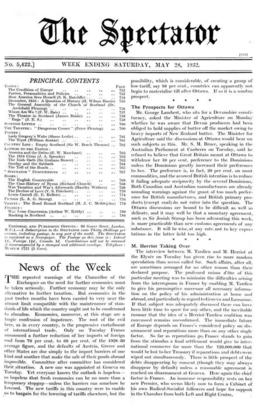M. Herriot Taking Over
The interview between M. Tardieu and M. Herriot at the Elysee on Tuesday has given rise to more random speculation than seems called for. Such affairs, after all, are sometimes arranged for no other reason than their declared purpose. The professed raison d'hrc of this particular meeting was to minimize the difficulties arising from the interregnum in France by enabling M. Tardieu to give his presumptive successor all necessary informa- tion on the policy of his administration at home and abroad, and particularly in regard to Geneva and Lausanne. If that subject was adequately discussed there can have been little time to spare for any other, and the inevitable rumour that the idea of a Herriot-Tardieu coalition was canvassed remains unconfirmed. The immediate future of Europe depends on France's considered policy on dis- armament and reparations more than on any other single factor. So far as reparations go, France stands to gain from the stimulus a final settlement would give to inter- national commerce far more than the £20,000,000 that would be lost to her Treasury if reparations and debts were wiped out simultaneously. There is little prospect of the debts disappearing by consent (though they may always disappear by default) unless a reasonable agreement is reached on disarmament at Geneva. Here again the chief factor is France. An immense responsibility rests on her new Premier, who seems likely now to form a Cabinet of his own Radical-Socialist followers and hope for support in the Chamber from both Left and Right Centre.








































